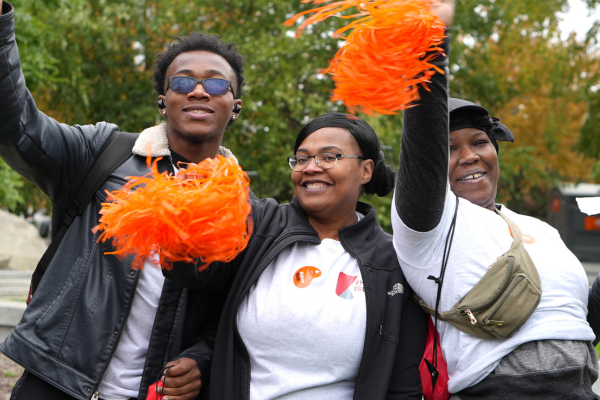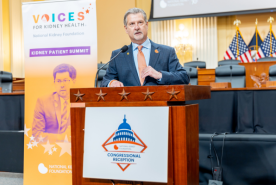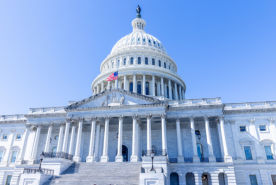February 26, 2024
From helping thousands discover their kidney disease risk and assuring equitable access to transplant, learn how NKF is fighting for KIDNEY EQUITY FOR ALL™.
Black/African American and Hispanic/Latino communities experience a disproportionately high burden of kidney failure but are less likely to receive kidney transplants compared to other populations.1
The National Kidney Foundation (NKF) envisions a future where these disparities are a thing of the past, a future where there is KIDNEY EQUITY FOR ALL™.
From advocating for policy changes to launching community-based kidney disease educational programs, discover how NKF is working to level the playing field for people receiving kidney and transplant services.
Why Kidney Equity Matters
Some people struggle to live healthily or access preventive healthcare, especially those in under-resourced communities.
Others receive subpar healthcare because of how others perceive them.
All people deserve equal access to the best preventive health and kidney care, no matter who they are or where they live.
So, what is NKF doing to make a more equitable future for everyone?
Learn more about health inequities in kidney care.
5 Kidney Equity Achievements
Here are five ways we are leading the charge towards a fairer future.
1. NKF's Quiz Helps Thousands Discover Their Kidney Disease Risk
One-third of Americans are at risk of kidney disease. Most don't even know it.
NKF has been working to close that gap with a free quiz explaining your kidney disease risk.
"Kidney disease is a public health crisis that could affect everyone at some point in their lives," said Dr. Sylvia Rosas, NKF’s President. "Everyone needs to know if they're the 33% of U.S. adults at risk for developing kidney disease."
To date, more than 700,000 people, including 400,000 Black/African Americans and Hispanic/Latinos, have taken the quiz and learned how to protect their kidney function.
But our efforts didn't stop there. NKF now offers the quiz in Arabic. We're also piloting a program in Michigan to help Native and rural communities learn about their kidney disease risk factors.
Do you know your risk? Take our one-minute quiz to find out.
2. Advocates Help Remove Race from the Kidney Donor Risk Index (KDRI)
The previous Kidney Donor Risk Index (KDRI) formula used race to help determine if a donor kidney would fail, automatically scoring donor kidneys from Black/African Americans less favorably than other kidneys.
Race is a socially constructed concept. It should not play a role in clinical calculations. Kidneys from people of all backgrounds function the same.
NKF fought hard to ensure the KDRI reflects this, gathering more than 2,000 signatures from Voices for Kidney Health advocates nationwide. Their voices were heard. On June 28th, 2024 the race-based indicator was eliminated from the KDRI. This change, along with removing Hepatitis C status, will help increase the number of kidneys available for transplantation.
"We believe all patients deserve equal access to kidney care and will continue to work towards that goal," Dr. Sylvia Rosas said. "This change is a testament to the power of collaborative advocacy."
Learn more about this historic win for donors and potential transplant recipients.
3. Assuring Equitable Access to Transplant
In the past, Black/African Americans with kidney disease faced challenges in getting on the transplant waitlist. This was due to an outdated eGFR equation that took race into account. The old equation overestimated Black/African Americans' kidney function. That meant waiting longer to get on the transplant waitlist.
Recognizing this disparity, NKF collaborated with the American Society of Nephrology to remove race from the equation. As a result, the U.S. now mandates all transplant hospitals adopt a new race-free eGFR equation.
This significant change promotes greater fairness and accuracy in diagnosing and treating kidney disease nationwide. The results have changed the lives of thousands of people with kidney disease, people like Glenda Roberts.
"I'm a kidney disease patient. When I looked at the old equation that included the race modifier, it elevated my eGFR by 16%. That impacted my ability to get on the transplant list by as much as two years."
The new equation lowered Glenda's kidney function range. Now, she and many others have fairer access to the transplant waitlist and a better chance at receiving a life-changing transplant.
Learn more about the new eGFR calculation.
4. Increasing Screening for High-Risk Groups
People with risk factors like high blood pressure or diabetes are at a higher risk of developing kidney disease. Despite this, many people don't know to get their kidney function tested. To make matters worse, those who do get tested don't always receive proper follow-up care.
The result? An untold number of people who don't know their kidneys may be quietly shutting down.
Through initiatives like CKDIntercept, NKF is working to ensure more people have access to possibly life-saving kidney testing.
In St. Louis, NKF helped distribute around 5,000 kidney disease test kits to those most at risk. We also helped local healthcare professionals provide consistent follow-up care to those who needed it.
The program was so successful that NKF received an additional grant to replicate it in more cities.
Learn more about CKDintercept.
5. Bringing Kidney Health to Diverse Audiences Nationwide
Every community is unique. That's why NKF has launched community-based kidney health strategies nationwide. Our tailored programs ensure everyone has culturally relevant, lifesaving kidney disease education.
- NKF's Big Ask Big Give program brings living kidney donation information to Spanish-speaking audiences in Colorado, New England, New Mexico, and Texas.
- KEEP Healthy kidney checks were customized to better serve people in Minnesota and Spanish-speaking Texans.
- We translated resources into multiple languages, including Spanish, Arabic, Bosnian, Burmese, Dari, Farsi, Kinyarwanda, Nepali, Pashto, Somali, Swahili, and Vietnamese.
Join the fight
NKF is fighting for a fairer future where everyone has equal access to kidney transplants. We need your help! Sign NKF’s Equity Spotlight Petition to help more people get the lifesaving transplant they need.
Sources
1 “Kidney Disease: The Basics.” National Kidney Foundation, 16 Nov. 2023, www.kidney.org/news/newsroom/fsindex#what-s-behind-racial-disparities-kidney-disease










